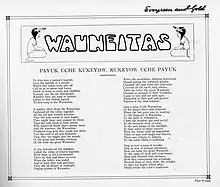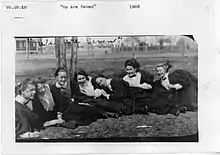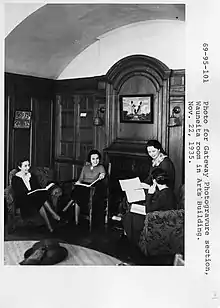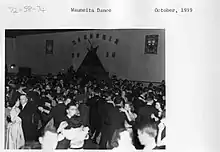Wuaneita Society
The Wuaneita Society was a women's group at the University of Alberta from 1908 to 1973.[1] For many decades, it functioned as a support system for the relatively few female students on campus. The group organized lectures, social events, and fundraisers, and eventually operated its own women-only study hall in the old Students' Union Building. The group's core traditions and identity were heavily appropriated from stereotypes of Cree culture, at a time in Canadian history when Indigenous communities were criminalized for practising their culture.[2]
 | |
| Named after | Rough translation of the Cree word for kind-hearted |
|---|---|
| Motto | payuk uche kukeyow, mena kukeyow uche payuk |
| Formation | 1908 |
| Founded at | University of Alberta, Edmonton |
| Dissolved | 1973 |
| Type | Women's club |
Membership | All female students |
Formerly called | Seven Independent Sisters (1908), Wuaneita Club (1909) |
Founding and identity

Of the 45 students in the University's first cohort in 1908, seven were women.[2] These original seven formed a type of sorority, called Seven Independent Spinsters, or S.I.S., with the intention of supporting the women's social and academic needs.[3] In 1909, when it became clear that there would be more than seven members, the group changed its name to the Wuaneita Club, and then to the Wuaneita Society in 1910.[3]
Like the Greek culture of fraternities and sororities, the Wuaneita women looked to other cultures to develop their identity and establish a unique character.[4] While histories of the organization note that the members chose their moniker from the Cree word for kind-hearted, there is no mention of what that Cree word was; the closest Cree word to Wuaneita is wanêyihtam, which translates to indicate a lack of logical thinking.[5] The motto of the group, "payuk uche kukeyow, mena kukeyow uche payuk,” is a grammatically rough translation into Cree of "all for one, one for all."[3]
In its early days, the club organized fundraising events, debates, lectures, dances and other social events and began the tradition of initiating all new female students.[3] All female students at the University were initiated into the Society each fall and paid a 75 cent membership fee.[3]
Growth and dissolution

Later, in the 1950s and 60s, the students operated Wuaneita Hall in the old Students' Union Building as a women-only space for studying and socializing.[1]
Throughout the 60s and 70s, as the university's female population grew, the club's thousands of members clashed over the group's purpose: some wanted to continue focusing on etiquette and domesticity while others were keen to address progressive issues like birth control and drug use.[6] The Club wound down in 1973.[2]
Cultural appropriation

The name, culture, and traditions of the Wuaneita Society are heavily appropriated from stereotypes of Cree culture; the women often called themselves "Tribe Wuaneita".[3] The name Wuaneita is a rough equivalent to the Cree word meaning "kind-hearted".[2] Initiation ceremonies featured First Nations accoutrements like feathers and headdresses, and initiates were welcomed using a "blanket of friendship" that would be draped over each woman's shoulders by the "Big Chief," the society president.[2] The motto of the group was "payuk uche kukeyow, mena kukeyow uche payuk,” a rough translation into Cree of "all for one, one for all" that is still engraved above the outer doors of Pembina Hall on main campus.[7]
In 1950, the new Students Union Building opened on campus and contained several student lounges, including an all-woman room for the Wuaneita Society.[8] The lounge was decorated with a large mural, commissioned by the Society from arts professor Henry George Glyde to depict an "ancient Cree legend," but there is no mention of which legend.[8] The work is titled When All the World was Burned and it remains on display on campus in the Rutherford Library atrium.[9]
For much of the Wuaneita Society's existence, as they were coopting First Nations traditions and ceremonies, the Potlatch ban was in effect in Canada.[2] While the Society was using First Nations culture to build a bond among female students at the university, the Canadian government was arresting Indigenous peoples across the country for the same practises.[10]
References
- Sydie, Rosalind; Prestwich, Patricia; Cullen, Dallas (2009). "Women's Studies at the University of Alberta". In Robbins, Wendy (ed.). Minds of our own : inventing feminist scholarship and women's studies in Canada and Québec, 1966-76. Wilfred Laurier University Press. pp. 163–164. ISBN 9781554587742.
- Scott, Sally (2015). "A Place for Women: The Wauneita Society at the University of Alberta". Edmonton City as Museum Project ECAMP. Retrieved 2020-07-01.
- McFadyen, Ursula (2016). "'How Kola': The Wauneita Society at the University of Alberta, 1908-1930". University Of Calgary, University Of Calgary, Paul Stortz. doi:10.11575/PRISM/26392. Cite journal requires
|journal=(help) - WOMEN IN HIGHER EDUCATION, 1850-1970 : international perspectives. [Place of publication not identified]: ROUTLEDGE. 2019. ISBN 0-367-26384-X. OCLC 1089843744.
- "wanêyihtam (Verb)". itwêwina Plains Cree Dictionary. Retrieved 2020-07-08.
- Standing on new ground : women in Alberta. Cavanaugh, Catherine Anne, 1945-, Warne, R. R. (Randi Ruth), 1952-. Edmonton [Alta.]: University of Alberta Press. 1993. ISBN 0-88864-258-X. OCLC 243593549.CS1 maint: others (link)
- "pîtos-mâmitoneyihtamowin (reimagine) UAlberta WEBSITE - Wauneita Society Club Motto". sites.google.com. Retrieved 2020-07-01.
- Schoeck, Ellen. (2006). I was there : a century of alumni stories about the University of Alberta, 1906-2006 (1st ed.). Edmonton: University of Alberta Press. pp. 386–387. ISBN 0-88864-464-7. OCLC 70884560.
- "pîtos-mâmitoneyihtamowin (reimagine) UAlberta WEBSITE - When All the World was Burned". sites.google.com. Retrieved 2020-07-08.
- Bracken, Christopher. (1997). The potlatch papers : a colonial case history. Chicago: University of Chicago Press. ISBN 0-226-06986-9. OCLC 36573703.